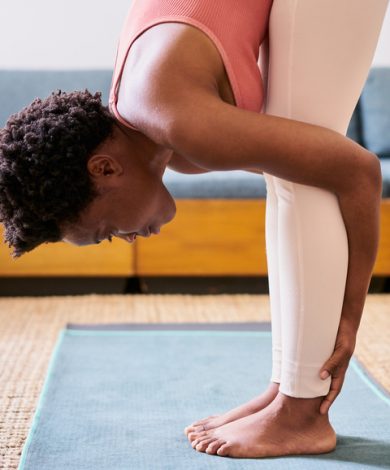With everything that comes with new mom life -- sleep deprivation, feeding, healing, adjusting --…
Self-Care
Birth Trauma Happens to 1 in 3 Women: 9 Healing Ways to Process It from a Naturopath
September 20, 2021 • By Bianca Smith

Statistics show that 1 in 3 women will experience birth trauma and 10 – 20% of first-time mothers will sustain long-term injuries following childbirth. Trauma can result from not only what occurs during labor and birth, but also how a mother feels after her experience.
A mother may feel a range of emotions such as shock, disappointment, anger, depression and deep sadness. As a fellow survivor of birth trauma, I know it can be incredibly lonely navigating this challenging path. Giving birth to your child is usually anticipated as one of life’s most joyous occasions but unfortunately, sometimes that isn’t the full picture.
Which is why I want to bring more awareness to this common yet heartbreaking occurrence with 9 key things you can do to support yourself through it.
Give Yourself Permission to Grieve
You are allowed to feel sad that you didn’t experience the birth you wanted. It DOES matter how you feel after your birth, regardless of the fact that you and bub are okay. All feelings are valid and it’s important to acknowledge them. This is what begins the healing process. A great place to start is writing your birth story or chatting to trusted friends.
Grieving is not a linear process and you may never fully “get over” your birth trauma. Nor should you feel you have to. You are not to blame for your birth trauma. Your healing process doesn’t have to be logical or line up with clinical assessments. And some of our most persistent symptoms might defy logic and biomedical reasons. Be where you are, allow the feelings to arrive, and do your best to process what comes up.
Retreat & Rest
Mothers need mothering too, especially after birth trauma. It’s so important that we’re compassionate and gentle with ourselves along the way. Because this experience adds additional layers of pain and healing that need to be honored and worked through in your own time. You may not feel ready for visitors for a while and this is okay. Give yourself permission to slow down, retreat and rest.
Nourish Yourself with Healing Foods
In the postpartum period, and even more so when birth trauma has occurred, it is so important to nurture yourself with healthy food.
A diet rich in whole, nutrient dense foods will reduce the risk of postpartum depletion which can be more common following birth trauma. If friends and family visit don’t be afraid to ask them to bring food along with them.
These snack bites support your recovery and lactation, this iron packed smoothie helps replenish your iron stores, these foods help support your mental health, and this article covers food to favor and avoid plus a nourishing recipe for a delicious Hash Bowl.
Set Important Boundaries
You are healing and settling into your role as a mother to a newborn, whether it is your first, second, or fifth. You require space to do this, without feeling external pressures from others. Yes, sometimes in life we must step outside of our postpartum role sooner than wanted because of external demands (perhaps work demands or older children), but saying no to non-crucial commitments is a necessity if you wish to avoid postpartum depletion. When friends and family visit, I recommend setting clear boundaries as to how long and how often. Enlist your partner or a trusted friend to help support you in holding and maintaining these boundaries.
Nourish Yourself with Nurturing Herbal Medicines
As a naturopathic practitioner, I always recommend using the many lovely herbal allies we have that can support new mothers. Particularly after birth trauma.
Some of my favourites include:
Red Raspberry leaf (Rubus idaeus): This article has 4 delicious ways to drink it! The astringent action will support uterine tone and the trace minerals make it incredibly nutritive.
Nettle (Urtica dioica): A lovely tonic which will support and strengthen the body after birth. It also contains many nourishing trace minerals.
Passionflower (Passiflora incarnata): A nervine herb which I like to recommend. Passionflower is perfect for supporting a new mama after birth trauma. It will nourish the nervous system and calm but not sedate.
Motherwort (Leonurus cardiaca): Also supportive for the nervous system and will help tone the uterus after birth.
Lemon balm (Melissa officinalis): Supportive for low mood, particularly if postpartum blues set.
Chamomile (Chamomilla recutita): A well-loved herbal medicine for a reason! Chamomile is lovely for calming the nervous system, is anti-inflammatory and will support digestion.
Brew any as a tea or an overnight infusion in a heatproof jar. You can combine them too! Strain then sip on throughout the day or as needed.
Try An Herbal Sitz Baths
A lovely way to promote healing, one sitz bath a day following birth can work wonders, particularly after an episiotomy or tearing during birth.
Some of my favourite herbs to incorporate in a sitz bath include Calendula, Yarrow, Lavender, Comfrey, Lady’s Mantle and Rosemary to name a few. I also like to add sea salt for its healing properties.
Simply add a handful of herbs and sea salt to a pot of boiling water, steep for 30 – 60 minutes, strain the herbs out then add the healing water to a bath high enough for your entire pelvis to be immersed.
Explore Flower Essences
Flower essences are a gentle way to heal the emotional components of birth trauma and to support a woman to recalibrate energetically.
Australian Bush Flower Essences
Fringed violet – Supports the release of the shock and trauma.
Bottlebrush – Supports the difficult transition from maiden to mother.
Bach Flowers
Olive – When you are completely exhausted on all levels.
Star of Bethlehem –Guides the mind and body back into alignment after trauma.
Mimulus – Helps when strong fears develop after experiencing trauma.
Rescue Remedy – a combination of Star of Bethlehem, Rock Rose, Impatiens, Clematis and Cherry Plum. Supportive after trauma, especially when experiencing shock.
Consult with a Women’s Health Physiotherapist
I cannot recommend Pelvic Health Physical Therapy enough. Birth trauma can have physical impacts that may not be picked up at a general 6-week postpartum check-up. Many prolapses get overlooked and women often think incontinence is a normal symptom to experience after birth. While common, it is not normal. Personally, I did not find out I had a prolapse or birth injury until I took this step.
Lean On Professional Support
Sometimes professional support is needed. There is nothing wrong with that. There are wonderful Psychologists, Psychotherapists, Physiotherapists, and therapies that can support healing birth trauma. EMDR has also been shown to be supportive when experiencing nightmares and flashbacks that are often associated with PTSD.
Here are some organizations I recommend exploring:
ABTA Birth-Related Trauma Support Group on Facebook
This is filled with many women sharing their personal experiences as well as professionals who add valuable insights. I have found it to be an empowering, supportive space.
PANDA – Perinatal Anxiety & Depression Australia
Australasian Birth Trauma Association
The Motherhood Center of New York
Above all, know that you are not alone in your experience and there is support out there to navigate this incredibly difficult journey. Your symptoms, your feelings, your healing will continue to shift and change with time. I hope the supportive practices and tips I share here encourage you to feel safe in the present moment. From one mother who experienced birth trauma to another, I’m holding your hand every step of the way.



